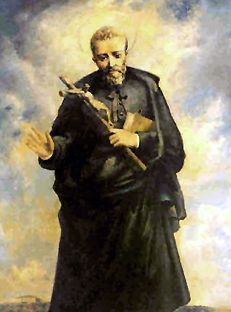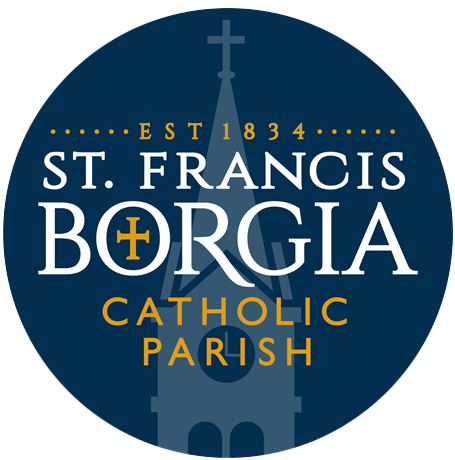Our Patron Saint
Saint Francis Borgia
Infamous Borgia Family Lineage
Francis Borgia belonged to one of the most prominent families of the kingdom of Aragon, a family that gave the Church two popes.
Born October 28, 1510, in Gandia, Valencia, Spain, he was the son of the Duke of Gandia; the great grandson, from his father’s side, of Pope Alexander VI, the notorious Borgia pope; and from his mother’s side, the great grandson of King Ferdinand of Aragon.

Pious Yet Nobleman
Although as a child he was very pious and wished to become a monk, his family sent him instead to the court of the Emperor Charles V. He distinguished himself there, accompanying the Emperor on several campaigns and marrying, in Madrid in September 1526, a Portuguese noblewoman, Eleanor de Castro Melo e Menezes, by whom he had eight children.
A Devout Catholic
In 1539, he convoyed the corpse of Empress Isabella of Portugal to her burial-place in Granada. It is said that, when he saw the effect of death on the beautiful empress, he decided to “never again serve a mortal master.” While still a young man, however, he was made viceroy of Catalonia by Emperor Charles V, and administered the province with great efficiency. At the same time, he was a devout Catholic. People at court even criticized him for receiving Communion too often!
A Chance Glance with His Destiny
Francis grew to be a devoutly religious young man, possessed of many natural gifts, and was a favorite at the court of Charles V. It is recounted that one day Francis passed through Alcalá, followed by his escort, and exchanged an emotional glance with a poor man being escorted to prison by the Inquisition. This man was Ignatius of Loyola, and at that moment, Francis could not have had any idea what an important role this man would play in his destiny.
The New Duke of Gandia
When his father died in 1543, Francis succeeded his father as the new Duke of Gandia. He retired to his native place and led, with his wife and family, a life devoted entirely to Jesus Christ and the Holy Catholic Church. He built a university there, received the degree of Doctor in Theology, and invited the Jesuits to his duchy. Francis’ grandmother joined her daughter in a convent of Poor Clares after the death of her husband and held a pious influence in the court of the Borgia, to which Francis was indebted. It was with these two women that holiness penetrated into the scandalous lineage of the Borgia family.
Duke Turned Jesuit
His wife, Eleanor, died in 1546. This was a turning point in Francis' life. He had become an acquaintance and admirer of St. Ignatius Loyola, founder of the new religious order, the Jesuits. He asked that he be admitted into that community as soon as family details could be worked out. Meanwhile, he quietly studied theology for the priesthood. By 1550, his children were provided for, and he renounced his titles in favor of his eldest son, Carlos. With his affairs in order, he entered the Society of Jesus in Rome. Naturally, the aristocratic world was startled to hear of a “Duke turned Jesuit.” Francis himself sought to become as humble as possible, but it was hard to break his old acquaintances from, for example, bowing to him.
A Great Administrator
Because of his high birth, great abilities and Europe-wide fame, he was immediately offered a cardinal’s hat. This, however, he refused, preferring the life of an itinerant preacher. While he preferred a quiet life of solitude, the Jesuits felt differently and promoted him so that he could use his great administrative talents for the church. In 1554, St. Ignatius appointed Francis commissary general for Spain and Portugal, where he practically founded the Society in Spain establishing many houses and colleges. This meant he was practically the head of the order in those countries. His skill as an administrator and his close friendships with the Spanish aristocrats were of great assistance to him in his work. He was crucial in dissolving the prejudices that his relative, Emperor Charles V, harbored against the Jesuits.
Father General
In 1565 this widower-priest was elected the third Father General or Superior General of the whole Jesuit order. The seven years of his generalship saw consolidation of the Society and expansion of its ministry, causing him to be recognized as the second founder of the Jesuit Order. Backed by St. Pius V who admired and trusted him, he was able to do great things for the Order in Rome and abroad, building two churches, and at times using his personal influence to obtain acceptance of the Jesuits. He established disciplined novitiates in every Jesuit province, writing regulations and books of spiritual instruction for them.
Missionary Zeal
Francis created a new Jesuit base in Poland and strengthened the community’s work in Germany and France. He multiplied its schools in Europe and its missions in the Far East and in America. Between 1566 and 1572 he launched the Jesuit mission to Spanish colonies in Florida, Mexico, and Peru. He maintained contact with the missioners by letter, advising them about their own spiritual lives and counseling them on strategy.
Drew Strength From Prayer
Although in poor health for his last years, he executed the governance and initiated projects of the Society with great energy. Francis was a man of contemplation and action in the fullest sense, and clearly drew much strength from the silence of his prayer.
Saintly Legacy
His successes have caused historians to describe Francis as the greatest General after Saint Ignatius. He founded the Collegium Romanum, which was to become the Gregorian University, dispatched missionaries to distant corners of the globe, advised kings and popes, and closely supervised all the affairs of the rapidly expanding order. Yet, despite the great power of his office, Francis led a humble life, and was widely regarded in his own lifetime as a saint.
Francis did not merit his halo just because he was a good executive. He was also a thoroughly good man, with a great zeal for personal perfection, for works of mercy, and for the reconstruction of the Catholic Church which had been badly shaken by the Protestant Reformation. Thus, St. Francis Borgia has been well described as “one of the sweetest, dearest, noblest men our poor old world has known.”
Canonized to Sainthood
In 1571 the pope sent Francis to Spain and Portugal to help build an alliance against the Turks. Worn by the responsibilities of his post and this last trip throughout Europe in which he was publicly hailed as a saint, he returned to Rome. Through his brother, Thomas, he sent a blessing to his children and grandchildren, and as their names were spoken to him, he prayed for each. He died on September 30, 1572, and was beatified in Madrid on November 23, 1624 by Pope Gregory XV. He was canonized nearly thirty five years later on June 20, 1670 by Pope Clement X.
Saint Francis Borgia is the Patron Saint of earthquakes.
Saint Francis Borgia, pray for us!
Citations:
McNamara, Father Robert F. (2016, October 10). Saint Francis Borgia. [Blog Post]; Retrieved from http://kateriirondequoit.org/resources/saints-alive/fabiola-fursey/st-francis-borgia.
Ghezzi, Bert (2016, October 10). Saint Francis Borgia, SJ (1510-1572). [Blog Post];Retrieved from http://www.ignatianspirituality.com

